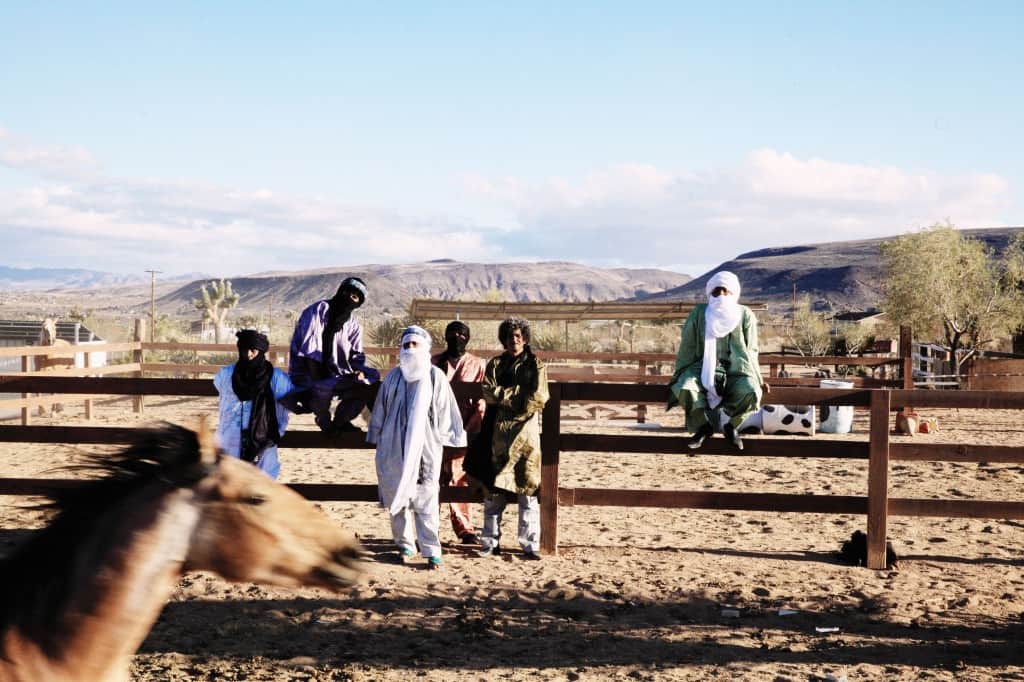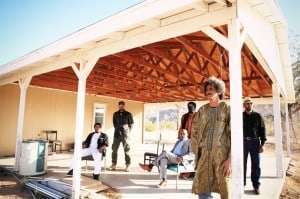November 13th, 2014

Tinariwen’s Emmaar (2014)
Tinariwen, The Harpoonist and the Axe Murderer sounds like a gruesome scene from the Kel Tamashek uprising of 1963 in northern Mali that saw the death of messianic Tinarwen frontman Ibrahim Ag Alhabib’s parents when he was a small boy. But in fact, it’s actually the group’s playbill for the North America tour for their latest album, Emmaar.
When The Harpoonist (Shawn Hall) and the Axe Murderer (Matt Rogers) walked onstage last weekend at the Luckman Fine Arts Complex to open for Tinariwen, not many people knew who these two guys from Vancouver were. The duo’s name apparently references the blues harp(oon) from a line in country music singer-songwriter Kris Kristofferson’s hit, “Me and Bobby McGee”: “I took my harpoon out of my dirty red bandana.” “Harp” being slang for the harmonica (Shawn Hall); “axe” is a common term for the guitar (Matthew Rogers). These two bust out the sounds of a full live blues and roots band playing their respective instruments while stomping and tapping out beats with both pairs of feet on kick drum, snare, foot tambourine, and shaker. (Check out the video at the end of this post to see them in action.) It’s no wonder why Tinariwen booked this Vancouver duo as the opening set for their entire North American tour.

The Harpoonist & the Axe Murderer
Perhaps it’s that DIY nature with which Saharan ‘desert blues’ band Tinariwen feels some kinship. As the story goes, Tinariwen was founded in 1979 by Ibrahim Ag Alhabib while he, Abdallah Ag Alhousseyni, and Alhassane Ag Touhami were scraping by in the Algerian refugee camp of Tamanrasset. The following year, they answered Muammar el-Quaddafi’s call to create a Saharan regiment of Tuareg fighters and received infantry training while performing their soulful dirges and finding fans amongst other sympathizers seeking to establish a single independent Tuareg republic. Their anthemic music became “the soundtrack for Tuareg independence and reconciliation,” spread via bootleg cassette tapes by their Kel Tamashek fans who began to call them “Kel Tinariwen,” derived from the word ténéré, which means ‘of the deserts.’

Tinariwen founder, Ibrahim Ag Alhabib
After the Tamanrasset Accords of 1991, Tinariwen left the military to fully devote themselves to music. Ibrahim says, “I had long ago realized that I was a musician and poet, and that these were better weapons with which to achieve what I wanted.” Performing their songs in mostly minor keys with static harmonies, like “Tahalamot,“ guitarist Abdallah layers consistent modal rhythms over a signature bass key, painting a vast ever-changing desert landscape.
Tinariwen’s blues sound is one of ‘assouf,’ expressing a deep loneliness and eternal yearning. Due to the political instability of Mali, they remain nomads, unable to return to their native homeland for risk of incarceration or worse. Now a multi-generational collective of musicians and songwriters, their timeless music sings of exile, struggle, and division, but also of “the beauty of the desert, the sky, the lands, our blues, and the nostalgia of an old time.”

Exiled from their native Mali, Tinariwen recorded their latest album, Emaar in Joshua Tree, CA.
Raised on North African protest music, Berber traditions, and raï music, Tinariwen were exposed in the military camps to the Western sounds of Led Zeppelin, Carlos Santana, and the “guitar-driven anthems of Jimi Hendrix and the American blues.” Also hugely influential was Malian bluesman Ali Farka Touré, who reinterpreted native kora and djéli (griot) music for electric guitar, creating a sound reminiscent of the Mississippi delta blues. Most African slaves brought over to the U.S. were originally from the Sahel region and kept the musical, cultural, and spiritual traditions of their native homelands, which would pave the way for the early twentieth century American blues tradition.
Bassist Eyadou Ag Leche says, “I’m told that a lot of the Africans who went to North America came from West Africa, from our part of the world. So it’s all the same connection. I think that any people who have lived through something that is very hard, feel this [assouf], this pain, this longing. That is what will make [our] music sound similar to each other.”
Tinariwen perform “Islegh Taghram Tifhaman” from their album, Emmaar.
The Harpoonist & the Axe Murderer perform “Love Me ‘fore Ya Leave Me.”
Tom Schnabel, M.A.

Chevalier de l’Ordre des Arts et des Lettres
Blogs for Rhythm Planet
Author & Music educator, UCLA, SCIARC, currently doing music salons
www.tomschnabel.com


